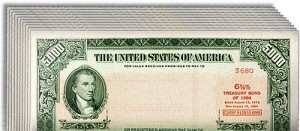T-Bills Definition:
Treasury bills (aka. T-Bills) are short-term debt obligations that are backed by the US government and which have less than a year’s maturity. They are sold in $1000 denominations and purchases can go up to 5 million. Commonly, T-bills come with 4-week (1 month), 13-week (3 month) or 26-week (six month) maturities.
The issuing of T-bills is done by a competitive bidding process where the bids are placed on “discounts from par” which means that unlike in the case of conventional bonds with fixed interest rates, here, it is the bond appreciation that gives the holder his returns.
 For example, if you buy a T-bill with a 13-week maturity at $9,950. What happens here essentially is that you give the government the use of your $9,950 and the US government will write you a $10,000 IOU which it agrees to pay you back after the 3-month period. You do not get regular payments as would be the case with coupon bonds. Instead, you get returns for how much the received value ($10,000) differs from the original discounted value paid by you ($9,950). So in this example, the interest rate that the T-bill pays is 0.5% ($50/$9950) over a period of three months. That would be the equivalent of an annual yield of about 2.01%. The U.S. Treasury publishes the Current T-Bill rate daily. As of this writing the 3 month T-Bill is yielding 0.10% or 0.40% (less than 1/2%) a year. In other words a $10,000 T-Bill will cost you $9,900.
For example, if you buy a T-bill with a 13-week maturity at $9,950. What happens here essentially is that you give the government the use of your $9,950 and the US government will write you a $10,000 IOU which it agrees to pay you back after the 3-month period. You do not get regular payments as would be the case with coupon bonds. Instead, you get returns for how much the received value ($10,000) differs from the original discounted value paid by you ($9,950). So in this example, the interest rate that the T-bill pays is 0.5% ($50/$9950) over a period of three months. That would be the equivalent of an annual yield of about 2.01%. The U.S. Treasury publishes the Current T-Bill rate daily. As of this writing the 3 month T-Bill is yielding 0.10% or 0.40% (less than 1/2%) a year. In other words a $10,000 T-Bill will cost you $9,900.
Why do people buy T-bills?
Treasury bills are considered the safest investments that one can make in bonds. They are short term and come with a discount, maturing in less than a year. They also come with full credit and faith of the Treasury, unless the Treasury itself went bankrupt. If you are planning to make an investment and leave out any risk or might need them at short notice again, then Treasury Bills are the ideal place to put in your money. The rate of interest is less than that of savings accounts and money market accounts.
How to buy T- Bills?
T- Bills can be purchased from a bank or via a broker or dealer and also from numerous online websites. Their issue is through auction bidding on a weekly basis. They were formerly paper bills notes but are now available only in an electronic form. You have to decide if you want your bid to be competitive or non-competitive. Non-competitive ones are a simple means to purchase treasury bills and is for those that are not experts in the field of security trading. In this type of bid, you agree to the interest rate that the auction decides, with a guarantee of the acceptance of your bid and of receiving back the complete amount paid by you. The interest rate is not known to you until the auction is closed.
In a competitive bidding, you specifically state the return you wish to receive. This type of bidding is taken up by corporations and those who have an understanding of the demands and supplies of the securities market. You do not have the assurance of your bid being accepted. The interest rate you state must be less than that set by the auction or must be equal to it for it to be accepted. All bidders receive this rate. If your bid exceeds the auction rate, then it will be rejected. Once you have decided on this, you can take part in Treasury Bills auctions.
See Also:
- What are I bonds?
- What are Treasury Inflation Protected Securities (TIPS)?
- What Are Good Investments?
- Impact of Inflation on Bonds Part 1 | Part 2
- Inflation Adjusted Gold vs Stocks vs Bonds
- U.S. Treasuries: The Comfortable Choice for Uncomfortable Investors
- A Brief Introduction to High Yield Bonds
- What are High Yield Bonds?
- What are Company (Corporate) Bonds?
- Invest in Structured Bonds?
- How to Invest for Safety
Photo Credits: by DonkeyHotey | US Treasury Bond


Leave a Reply